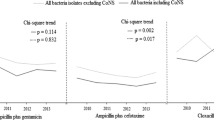Abstract
Background
Both Staphylococcus aureus and coagulase negative Staphylococci are common causes of late-onset neonatal sepsis in the neonatal intensive care unit (NICU), usually relating to intravascular access device infections.
Aims
This project aimed to review the impact on antimicrobial treatment and clinical outcome in the NICU setting, of the introduction of the Xpert MRSA/SA BC test (Cepheid, USA) for the identification of staphylococci in blood cultures.
Methods
A retrospective audit was carried out of the pre- and post-intervention periods; the intervention was the introduction of the Xpert MRSA/SA BC test.
Results
In total, 88 neonates had positive blood cultures with Staphylococcus spp., comprising 42 neonates in the pre-intervention and 46 in the post-intervention groups. The pre-intervention group had a higher birth weight (1.541 kg vs. 1.219 kg, p = 0.05) and higher platelet count (288 vs. 224 × 109/L, p = 0.05). There was a trend towards a shorter duration of antimicrobial therapy in term infants and in the length of admission; however, this was not statistically significant (p = 0.2). All of the nine infants post-intervention with significant bacteraemia (S. aureus =3, CoNS =6) were changed to the optimal antimicrobial at the time the result was available.
Conclusions
This study shows that the introduction of the Xpert MRSA/SA BC test can lead to a reduction in the length of admission and duration of antimicrobials in term infants; however, the difference was not statistically significant. All nine infants with clinically significant bacteraemia were treated with the appropriate antimicrobial when the Xpert MRSA/SA BC test result was available.
Similar content being viewed by others
References
Lee JH (2011) Catheter-related bloodstream infections in neonatal intensive care units. Kor J Pediatric 54(9):363–367. doi:10.3345/kjp.2011.54.9.363
Tran HT, Doyle LW, Lee KJ, Dang NM, Graham SM (2015) A high burden of late-onset sepsis among newborns admitted to the largest neonatal unit in central Vietnam. J Perinatol 35(10):846–851. doi:10.1038/jp.2015.78
Ish-Horowicz MR, McIntyre P, Nade S (1992) Bone and joint infections caused by multiply resistant Staphylococcus aureus in a neonatal intensive care unit. PIDJ 11(2):82–87
Vergnano S, Menson E, Kennea N et al (2011) Neonatal infections in England: the NeonIN surveillance network. Arch Dis Child Fetal Neonatal Ed 96(1):F9–f14. doi:10.1136/adc.2009.178798
Dharan NJ, Blakemore R, Sloutsky A et al (2016) Performance of the G4 Xpert® MTB/RIF assay for the detection of mycobacterium tuberculosis and rifampin resistance: a retrospective case-control study of analytical and clinical samples from high- and low-tuberculosis prevalence settings. BMC Infect Dis 16(1):764. doi:10.1186/s12879-016-2039-4
Geiger R, Smith DM, Little SJ, Mehta SR (2016) Validation of the GeneXpert® CT/NG assay for use with male pharyngeal and rectal swabs. Austin J HIV AIDS Res 3(1)
Pettitt J, Higgs E, Fallah M et al (2016) Assessment and optimization of the GeneXpert diagnostic platform for detection of Ebola virus RNA in seminal fluid. J Infect Dis. doi:10.1093/infdis/jiw599
Burrell AR, McLaws ML, Fullick M, Sullivan RB, Sindhusake D (2016) SEPSIS KILLS: early intervention saves lives. Med J Aust 204(2):73.e71–73.e77
Thaden JT, Ericson JE, Cross H et al (2015) Survival benefit of empirical therapy for Staphylococcus aureus bloodstream infections in infants. PIDJ 34(11):1175–1179. doi:10.1097/inf.0000000000000850
Davies J, Gordon CL, Tong SY, Baird RW, Davis JS (2012) Impact of results of a rapid Staphylococcus aureus diagnostic test on prescribing of antibiotics for patients with clustered gram-positive cocci in blood cultures. J Clin Micro 50(6):2056–2058. doi:10.1128/jcm.06773-11
Spencer DH, Sellenriek P, Burnham CA (2011) Validation and implementation of the GeneXpert MRSA/SA blood culture assay in a pediatric setting. Am J Clin Path 136(5):690–694. doi:10.1309/ajcp07ugyokbvvnc
Zboromyrska Y, De la Calle C, Soto M et al (2016) Rapid diagnosis of staphylococcal catheter-related bacteraemia in direct blood samples by real-time PCR. PlosOne 11(8):e0161684. doi:10.1371/journal.pone.0161684
Author information
Authors and Affiliations
Corresponding author
Ethics declarations
Funding
No specific funding was required for this study as it was a retrospective audit. This research involved an international collaboration between Perdana University–Royal College of Surgeons in Ireland (PU-RCSI) School of Medicine, and Research Summer School–Royal College of Surgeons in Ireland (RSS-RCSI). We would like to acknowledge the original sponsorship of the GeneXpert machine from the Dublin North East Health Service Executive SARI Committee to the Rotunda Hospital.
Conflict of interest
The authors declare that they have no conflict of interest.
Rights and permissions
About this article
Cite this article
Koh, L.L., O’Rourke, S., Brennan, M. et al. Impact of a rapid molecular test for positive blood cultures from neonatal intensive care patients on clinical management: a retrospective audit. Ir J Med Sci 187, 423–427 (2018). https://doi.org/10.1007/s11845-017-1649-1
Received:
Accepted:
Published:
Issue Date:
DOI: https://doi.org/10.1007/s11845-017-1649-1




